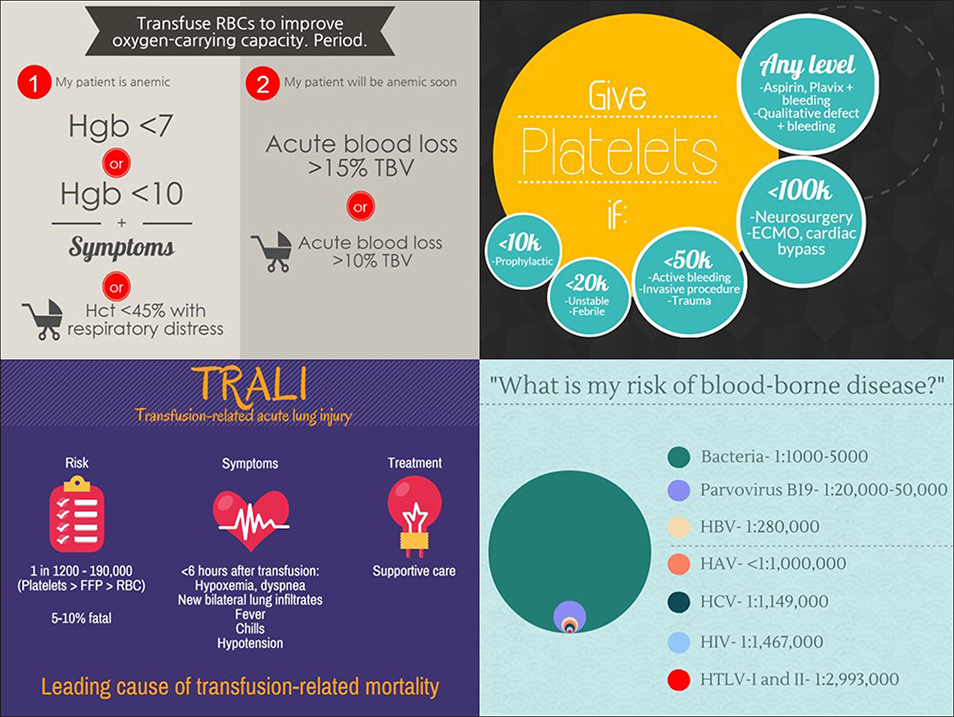Blood Res.
2019 Jun;54(2):125-130. 10.5045/br.2019.54.2.125.
The top 10 things to know about transfusion medicine before intern year: an evidence-based course for graduating medical students
- Affiliations
-
- 1Department of Pathology and Laboratory Medicine, University of North Carolina, Chapel Hill, NC, USA. Alexis.Peedin@jefferson.edu
- KMID: 2451013
- DOI: http://doi.org/10.5045/br.2019.54.2.125
Abstract
- BACKGROUND
Transfusion medicine (TM) knowledge varies widely among physician trainees. In addition, there have been few instances in which curricular changes have been meaningfully assessed for TM education in medical school.
METHODS
We created and presented a novel lecture to improve TM knowledge for graduating medical students using eight objectives designed to reinforce critical information about blood management. Each objective was coded according to unique color schemes, fonts, and graphics to create visual associations while quickly and clearly presenting complex concepts. The validated BEST Collaborative exam was used to measure changes in student TM knowledge, while a survey was conducted to gauge changes in confidence for each objective. Students were asked to submit anonymous feedback about their experiences.
RESULTS
The mean student post-course exam score was 50.0%, while the pre-course baseline score was 27.5% (P<0.0001). Mean confidence levels increased significantly for all objectives. Student feedback was universally positive.
CONCLUSION
This study improved knowledge and confidence for graduating medical students by utilizing engaging and visually stimulating presentations to display high-impact TM material. However, further efforts are needed to optimize learning.
Keyword
MeSH Terms
Figure
Reference
-
1. Bryant BJ, Alperin JB, Indrikovs AJ. Blood bank on-call physician's experiences at a large university medical center. Transfusion. 2005; 45:35–40.
Article2. O'Brien KL, Champeaux AL, Sundell ZE, Short MW, Roth BJ. Transfusion medicine knowledge in Postgraduate Year 1 residents. Transfusion. 2010; 50:1649–1653.3. Karp JK, Weston CM, King KE. Transfusion medicine in American undergraduate medical education. Transfusion. 2011; 51:2470–2479.
Article4. Cable RG, Thal SE, Fink A, Calhoun L, Petz LD. A comprehensive transfusion medicine curriculum for medical students. Transfusion Medicine Academic Award Group. Transfusion. 1995; 35:465–469.
Article5. Smith BR, Aguero-Rosenfeld M, Anastasi J, et al. Educating medical students in laboratory medicine: a proposed curriculum. Am J Clin Pathol. 2010; 133:533–542.6. Morgan S, Rioux-Masse B, Oancea C, Cohn C, Harmon J Jr, Konia M. Simulation-based education for transfusion medicine. Transfusion. 2015; 55:919–925.
Article7. Molinaro RJ, Winkler AM, Kraft CS, et al. Teaching laboratory medicine to medical students: implementation and evaluation. Arch Pathol Lab Med. 2012; 136:1423–1429.
Article8. American Clinical Laboratory Association. Clinical laboratory testing: Life saving medicine starts here. Washington, DC: American Clinical Laboratory Association;2007. Accessed December 20, 2018. https://www.acla.com/wp-content/uploads/2013/12/ACLA_Overview_OneSheet_v07.pdf.9. Haspel RL, Lin Y, Fisher P, Ali A, Parks E. Biomedical Excellence for Safer Transfusion (BEST) Collaborative. Development of a validated exam to assess physician transfusion medicine knowledge. Transfusion. 2014; 54:1225–1230.
Article10. Haspel RL, Lin Y, Mallick R, et al. Internal medicine resident knowledge of transfusion medicine: results from the BEST-TEST international education needs assessment. Transfusion. 2015; 55:1355–1361.
Article11. Lin Y, Tinmouth A, Mallick R, Haspel RL. BEST-TEST2 Investigators. BEST-TEST2: assessment of hematology trainee knowledge of transfusion medicine. Transfusion. 2016; 56:304–310.
Article12. Urdan T, Pajares F. Self-efficacy beliefs of adolescents. Charlotte, NC: Information Age Publishing;2006. p. 307–337.13. Davis DA, Mazmanian PE, Fordis M, Van Harrison R, Thorpe KE, Perrier L. Accuracy of physician self-assessment compared with observed measures of competence: a systematic review. JAMA. 2006; 296:1094–1102.
Article14. Regehr G, Eva K. Self-assessment, self-direction, and the self-regulating professional. Clin Orthop Relat Res. 2006; 449:34–38.
Article
- Full Text Links
- Actions
-
Cited
- CITED
-
- Close
- Share
- Similar articles
-
- Changing Perceptions of Graduating Students on a Decade of Criterion-Referenced Assessment and Grading System Implementation
- Nursing Students' Error and Recovery in Transfusion Simulation for Safety Competency
- Are There Gaps in the Perception of Medical Students' Professionalism Between Medical Students and Professors?
- Factors influencing Evidence-Based Practice Attitudes among Undergraduate Nursing Students
- Comparison of Student Nurses Graduating from a Junior College or a University on Observation and Performance of Nursing Roles


